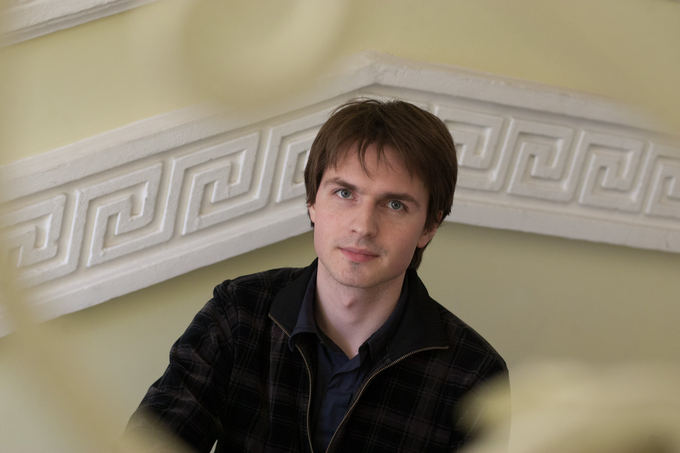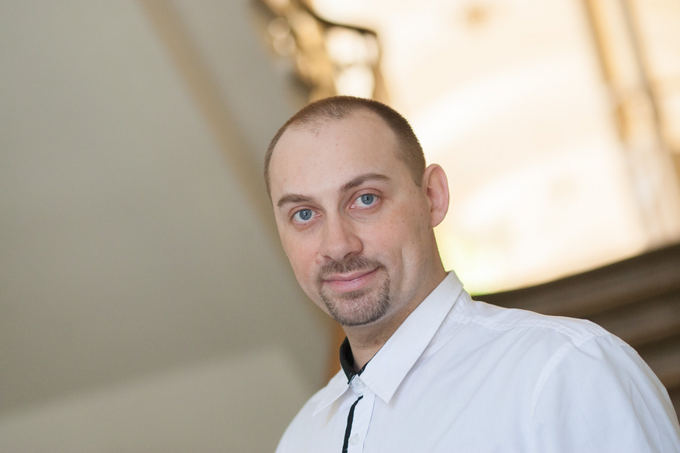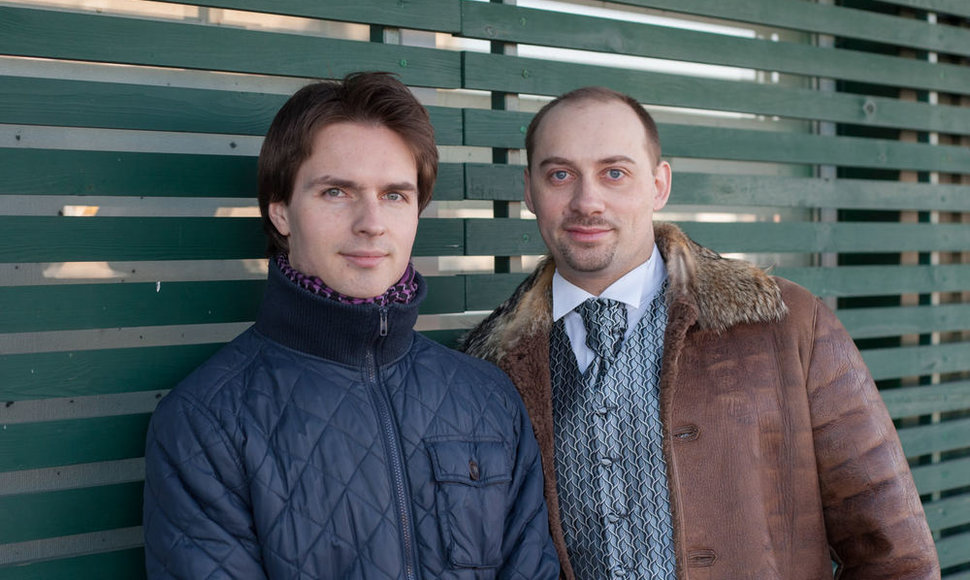Both singers admit they sometimes hear sceptical remarks from their more conservative colleagues, yet they are resolved to break the ice in repertoires suitable for their voices and prove that labelling has no place in art.
– You two have very different stories about how you came to sing in high vocal range – Viktoras has dreamed about and working towards it since adolescence, while Algirdas discovered the new abilities of his voice very recently. Can you recall the moment you realized you could sing in unusually high voice?
Algirdas Bagdonavičius: Three years ago, Klaipėda Musical Theatre was producing The Coronation of Poppaea and Latvian conductor Andris Veismanis unexpectedly discovered a countertenor in me. One ensemble required an exceptionally high male voice – I gave it a go, the conductor liked it and offered me the main role of Ottone, while I was only auditioning for a small tenor part. This way, I had to double with soloist Dalia Kužmarskyte.
 |
| Viktoras Gerasimovas |
– How did you feel when you learned you could sing so high – unlike everyone else?
A.B.: I took it as a challenge to explore what I can. And it was worth it – the feedback has been very positive, it encouraged me to search for different ways of singing, for a different kind of repertoire. At the moment, I would like to concentrate on perfecting this technique – I have a vision and can definitely see a bright future.
– What about you, Viktoras? How did you come to strive for singing in an exceptionally high vocal range as a teenager?
Viktoras Gerasimovas: The dream did not begin in my teens, but even earlier, in childhood, along with the first glimpses of personality formation (smiles). The turning point happened when I was singing at Kačinskas Music School's boys choir and we were invited to Klaipėda Musical Theatre. I was so impressed by what I saw and heard there that from that moment on, all I wanted to do was theatre. In that performance, the main part of Angelica was performed by Valerija Balsytė – I was overcome with desire to sing.
– Why were you attracted to the high range? You could as well have dreamt of doing baritone or tenor parts.
V.G.: I don't know... When I revisit that moment now, it was probably the beauty, sacredness, and brightness of the high voice that I sensed. In Faust, for example, the bass is associated with the underworld, whereas Marguerite, the role I performed, is closer to heaven, to the sacred. Perhaps that's what attracted me.
– How would you account for the fact that you are so unique? You, Viktoras, are the only sopranino in Lithuania. Is it because only a few singers manage to keep their vocal range after puberty or singers themselves choose not to sing so high?
V.G.: There might be some who are indeed reluctant – as far as I know, there were similar voices during entrance exams in both Vilnius and Kaunas. But being a sopranino does require a great deal of inner strength in order to survive initial challenges and obstacles at the academy. There are many opinions and rumours about male voices that are so high – perhaps that's the reason why some people do not go for it.
A.B.: It is hardly a secret that there are intolerant people out there who put all kinds of labels on us. But there can be no labelling in art – if there's quality, vocal culture, that's all there is to know. Viktoras was the first one and he led the way, so I had it easier – I've only noticed a few smirks whenever I start singing. Musicians and lovers of music appreciate not the kind of vocal range you sing in but how well you master your voice, if you have a pleasant timbre. By the way, high male voices must be pleasant – I've heard countertenors who were painful to listen to.
V.G.: I have studied in England, where this kind of singing is taken as a normal thing, and my teacher, who has tutored great many well-known singers, admitted that she only started liking countertenors after hearing me sing. I then realised that my voice must have something exceptional (smiles).
 |
| Algirdas Bagdonavičius |
– Have you encountered scepticism in the Lithuanian academia?
V.G.: No one said anything to my face, but I have heard rumours that people are talking about it.
A.B.: Very recently, an older colleague from the National Opera Company asked me, without hiding his scepticism: “Well, why are you singing like that?” I feel great respect towards that man, a true stage veteran, but his over-conservative judgement has no validity.
– Perhaps negative judgements have something to do with the 17-18th century tradition to castrate boy singers – something that people still cannot forget?
A.B.: At the time, this was one of the ways how poor families could make a better living on their children, so in Italy, boys would be castrated en masse in order to preserve high-pitch voice. But let me note that only a small percentage of such boys actually managed to retain good voices. These men would be physically and psychologically crippled for the rest of their lives. Even though a great deal of baroque opera music was written for castrato voices, there are no fewer parts for countertenors.
By the way, 9-10th century Gregorian chorals would only be sung by men with naturally high voices – there was no castrato tradition back then.
– Does Lithuanian theatre repertoire allow you to showcase your voices?
V.G.: In general, the range of roles for our voices is no smaller than that for baritones or tenors. In Lithuania, however, many composers are still undiscovered, so opportunities to showcase what we can are limited.
A.B.: But if we continue to work, we will break the ice for a different repertoire. Great many roles for our type of voice have been written in Baroque as well as in modern times. Particularly in the second half of the 20th century, composers started writing pieces for high vocal range. Composers are interested in countertenor voices as a new and promising province. Besides, we can simply perform any romantic piece elevated to our vocal range.
– In most cases these are female roles?
V.G.: Not at all. Say, in Mozart's The Marriage of Figaro, the Page is a male part, albeit often performed by women. In Faust, produced by the Baltic Chamber Opera Theatre, I played Marguerite and it was the first female role in my entire career – until then, I'd only done male roles.
– Was it difficult to play a woman?
V.G.: Dressing up as a woman is not complicated – it is theatre, after all. And I can identify with psychological experiences of the character, draw on my own experience even without being a woman.
A.B.: True art is above genders, races, religions, or stereotypes.
– How does the Lithuanian public respond to your talent?
A.B.: Perhaps they are a little surprised when they hear the first sounds, but afterwards they just relax and enjoy good music. Only the beginning might seem shocking, because it is unusual, but if your performance is top-notch, the audience likes it. No more doubts remain.
I am optimistic about the future. There is a wealth of baroque masterpieces that have never been performed in Lithuania – the public will see how original and beautiful they are.
– So you are icebreakers of such singing?
V.G.: Pioneers (laughs).















